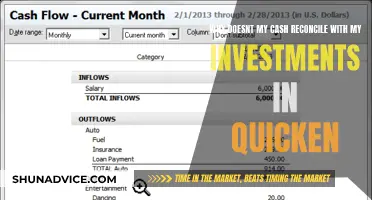
Home equity is the difference between the market value of your property and the amount you still owe on your home loan. For example, if your home is worth $500,000 and you still owe $320,000, your equity is $180,000. You can use this equity to invest in a second property, renovate your home, or achieve other financial goals. However, there are risks and costs associated with using home equity to invest, so it's important to do your research and consider all your options before making any decisions.
| Characteristics | Values |
|---|---|
| What is home equity? | The difference between the market value of your property and the amount you still owe on your home loan. |
| How to calculate home equity | Property's market value – Remaining loan balance = Your home equity |
| How to calculate usable equity | 80% of Property Value – Remaining loan amount |
| How to use home equity | To buy an investment property, renovate or achieve other goals. |
| How to access home equity | Refinancing, home loan top-up, a new supplementary loan account, cross-collateralisation, etc. |
| Things to consider before using home equity to invest | Long-term goals, a rainy-day fund, tax implications, loan type, etc. |
What You'll Learn

Pros and cons of using home equity to invest
Using home equity to invest can be a powerful tool for building wealth, but it comes with certain risks. Here are some of the pros and cons to consider:
Pros:
- Leverage: Home equity can provide access to a large amount of capital, allowing you to make significant investments.
- Low-cost funding: Interest rates on home equity loans tend to be lower than other forms of credit, making it a cost-effective funding option.
- No cash deposit required: Using home equity means you may not need to provide a physical cash deposit when purchasing a second property.
- Potential tax benefits: Investment properties may offer tax deductions and negative gearing benefits, although this depends on your income and situation.
- Long-term wealth creation: Investing in property is often a strategic way to build long-term wealth and financial security for retirement.
Cons:
- Risk of losing your home: If you default on the loan, you could lose one or multiple assets, including your primary residence as well as your investment property.
- Increased debt: You will be taking on more debt, which may impact your financial situation and ability to service the loans.
- Limited liquidity: Home equity may not always be readily accessible, and lenders typically allow you to borrow up to 80% of your home's value without incurring additional costs like Lenders' Mortgage Insurance (LMI).
- Impact on cash flow: You will need to manage the extra repayments and costs associated with an investment property, especially if it is negatively geared.
- Tax implications: While there may be tax benefits, there can also be complex taxation considerations. It is essential to seek independent tax advice to understand the implications for your specific circumstances.
- Reduced financial flexibility: Taking on additional debt may reduce your financial flexibility and ability to respond to unexpected expenses or economic downturns.
- Potential for negative equity: If property values decline, you could find yourself in a situation of negative equity, where the outstanding loan balance exceeds the market value of the property.
Preparing a Cash Flow Statement: Investing Activities Guide
You may want to see also

Calculating usable home equity
Calculating your usable home equity is a relatively straightforward process.
Firstly, you need to know the market value of your home. This can be done through an online home price estimator, a real estate agent valuation, or by looking at comparable sales in your area.
Next, you need to find out the outstanding balance on your mortgage. This information can be found on your most recent mortgage statement, or by contacting your lender.
Now, simply subtract the outstanding balance from the market value of your home. This will give you your total home equity.
However, it's important to note that not all of this equity is accessible. Lenders will typically only allow you to borrow up to 80% of your home's value without charging Lender's Mortgage Insurance (LMI). So, to calculate your usable home equity, multiply your home's value by 0.8, and then subtract your outstanding mortgage balance.
For example, let's say your home is worth $400,000, and you have a remaining mortgage balance of $220,000. Your total home equity would be $180,000 ($400,000 - $220,000). However, your usable home equity would be $100,000 ($400,000 x 0.8 = $320,000 - $220,000).
It's also worth noting that you may be able to borrow more than 80% if you take out Lenders Mortgage Insurance, or by using the equity in an existing investment property. Additionally, when calculating your usable equity, your lender or mortgage broker may require a formal bank valuation of your home.
Where to Park Cash: TD Ameritrade Options
You may want to see also

Steps to access home equity
There are a few steps you can take to access your home equity. Here is a detailed breakdown:
Calculate the Available Equity
Firstly, you need to work out how much equity is available in your property. This can be done by estimating the market value of your home, which can be based on comparable sales within your area or a real estate agent valuation. From this estimated value, subtract the balance of your current loans secured by the property.
Work Out the "Accessible" Equity
Next, you need to determine how much money you will need to achieve your plans. You may not want to access the full amount of equity available, and your ability to service any additional repayments may impact the amount of equity you can access. For example, if you have $150,000 worth of equity but can only afford additional repayments of $50,000, then it is more realistic to unlock $50,000.
Review Your Loan Options
At this point, you can start researching and assessing your home loan options, perhaps with the help of a mortgage broker. They can also perform a "health check" on your current home loan, comparing it to other options based on factors like interest rates, fees, and features.
Work Out the Costs for Accessing Equity
The product you choose and the amount of equity you want to access may result in various fees and costs. For example, accessing over 80% of your property's value will likely incur Lenders' Mortgage Insurance (LMI). Switching lenders may also incur costs such as fees for breaking from a fixed-rate product.
Loan Application and Settlement
Once you've decided on a loan option, your broker will work with you to get the application process started and support you through to settlement.
Maximizing Your HSA: Smart Investing for Beginners
You may want to see also

Costs of accessing home equity
The costs of accessing home equity can vary depending on the lender and the amount of equity being accessed. Here are some common costs associated with accessing home equity:
- Lender's Mortgage Insurance (LMI): If you access more than 80% of your property's value, you will likely need to pay LMI. This insurance protects the lender in case you default on the loan.
- Fixed costs: These include appraisal fees, title search fees, and title insurance. Appraisal fees can range from $300 to $450, while title insurance costs can range from $500 to $3,500.
- Credit report fees: Lenders will usually perform a hard pull of your credit report, which can cost between $10 and $100.
- Legal fees: Some states require an attorney to review loan documents, while in others it is optional. Legal fees can range from $100 to $300 or comprise 0.5% to 1% of the loan amount.
- Processing fees: These fees are charged by the local county clerk's office for filing the loan agreement and can range from $20 to $100.
- Origination fees: Some lenders charge an upfront fee for processing your application, which can be a flat fee or a percentage of the loan amount, typically up to 1%.
- Break costs: If you switch to another lender, you may incur costs such as fees for breaking from a fixed-rate product, a new loan application fee, or government fees.
It's important to note that these costs can vary significantly, and it's always a good idea to shop around and compare fees among different lenders. Additionally, there may be ongoing expenses associated with maintaining a line of credit or early cancellation fees if you pay off the loan ahead of schedule.
Invest Your Weekly Cash Wisely: A Guide to Getting Started
You may want to see also

Tax implications of using home equity to invest
Using home equity financing to fund investments can have several tax implications, and the rules have changed in recent years. Here are the key points to consider:
Potential Deductions for Home Equity Loans and HELOCs (Home Equity Line of Credit)
Before 2018, interest paid on a home equity loan or HELOC of up to $100,000 was deductible regardless of how the funds were used. However, the Tax Cuts and Jobs Act of 2017 changed this rule. Now, the interest on these loans is only deductible if the funds are used to "buy, build, or substantially improve" your home. If the funds are used for other purposes, such as paying off debt or financing a vacation, the interest is no longer deductible. The new rules apply to loans taken out after December 15, 2017, but older loans may still be eligible for deductions under the previous rules.
Tax Implications of Selling a Home After Using Home Equity
When you sell your home after using home equity financing, the amount borrowed must be repaid from the proceeds of the sale. The tax implications depend on factors such as how long you've owned the home and how much you've borrowed. If you've owned the home for more than two years and lived in it as your primary residence for at least two of the past five years, you may be eligible for the home sale exclusion, which allows you to exclude up to $250,000 in capital gains if you're single or up to $500,000 if married filing jointly. However, using home equity financing may reduce or eliminate this exclusion. Additionally, if you sell your home at a loss, the amount you borrowed may reduce the amount of loss you can deduct.
Other Considerations
There are a few other tax implications to keep in mind. If you use the funds for home improvements, you may be able to increase your home's basis, reducing your capital gains when you sell. If you use home equity financing to buy a rental property, the interest paid may be deductible as a business expense. It's important to keep accurate records of all transactions and interest payments for tax purposes.
Quick Ratio: Short-Term Investments for Short-Term Gains?
You may want to see also
Frequently asked questions
Home equity is the difference between your property's market value and the balance of your mortgage. For example, if your home is worth $500,000 and you have $150,000 remaining on your loan, your home equity is $350,000.
Lenders will typically lend you 80% of the value of your home, minus the debt you still owe. So, if your home is valued at $400,000 and you have $100,000 owing on your mortgage, your usable equity is $220,000.
You can use your home equity to buy an investment property or renovate your current home. You can also use it for other purposes, such as achieving lifestyle goals, buying a car, or going on holiday.







